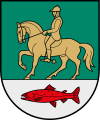Priekulė
| Priekulė | |||
|---|---|---|---|
| City | |||

Main street toward Klaipėda
|
|||
|
|||
| Location of Priekulė | |||
| Coordinates: 55°33′20″N 21°19′10″E / 55.55556°N 21.31944°ECoordinates: 55°33′20″N 21°19′10″E / 55.55556°N 21.31944°E | |||
| Country |
|
||
| Ethnographic region | Lithuania Minor | ||
| County |
|
||
| Municipality | Klaipėda district municipality | ||
| Eldership | Priekulė eldership | ||
| Capital of | Priekulė eldership | ||
| First mentioned | 16th century | ||
| Granted city rights | 1948 | ||
| Population (2005) | |||
| • Total | 1,690 | ||
| Time zone | EET (UTC+2) | ||
| • Summer (DST) | EEST (UTC+3) | ||
Priekulė (![]() pronunciation , German: Prökuls) is a small city in Klaipėda district municipality, Lithuania. It is located in the former curonian landscape Lamotina on the banks of Minija River about 20 km south of Klaipėda. Priekulė is the seat of Priekulė elderate. Priekulė was part of East Prussia for most of its history and became part of Lithuania from 1923–1938 and after World War II in 1945.
pronunciation , German: Prökuls) is a small city in Klaipėda district municipality, Lithuania. It is located in the former curonian landscape Lamotina on the banks of Minija River about 20 km south of Klaipėda. Priekulė is the seat of Priekulė elderate. Priekulė was part of East Prussia for most of its history and became part of Lithuania from 1923–1938 and after World War II in 1945.
The curonian-Latvian name describes a market place: "preks": price; "prece": merchandise (see also pr.-lit. "prekius": to offer, to haggle). The ending -uls/ -ol is a diminutive and shows that this place was not of great importance.
Priekulė's name is known since the first half of the 16th century. At first it was named Paminia (at river Minia), and it was a small village with three homesteads. 1511 is a tavern "zur Minnige" testified. 1540 is a certain Lukas Preckol owner of the tavern. The name "Precols" was recorded on region maps in 1548. A church was built in 1587 and a teacher was hired in 1594.
In 1609 during the Polish–Swedish War (1600–1611), regiments of the Polish–Lithuanian cavalry plundered the town. In 1688 minister Wilhelm Martin built a new church. In 1905 the village, now known as Prökuls, had 500 residents who were mostly Protestant Lutherans and mainly spoke the Memelland-Samogitian dialect. Before World War II around 1,200 people lived in Priekulė among them very few ethnic Germans.
...
Wikipedia



